Panhandle Land Mammals
Floirda Black Bear
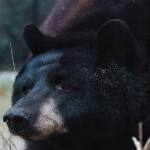
The Florida Black Bear, Florida's largest mammal, is an omnivorous species which feed on several native Florida plants. They are generally solitary but are kept closely to mother bear while maturing. It is very important to keep bear and human interaction to a minimum, especially in highly populated areas. Some ways to help is to keep a "bear proof" trash can and lid or by simply leaving your trash locked away in a garage on non-pick up days.
Deer
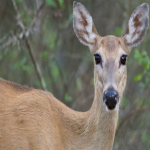
Deer are forging animals which are most active at dawn and dusk. They are often seen on the sides of Florida's rural roadways during these hours. If you are driving through these areas at dawn or dusk be sure to keep an eye out for deer. Use perephial vision along with your brights (as you are able). Refrain from swerving while avoiding a darting deer. It is best to slow down to a complete stop and to honk your horn if a deer is seen in the road.
Bobcats

The elusive Bobcat is an effecient predatory cat found all throughout the state of Florida. They often hunt at night for small rodents or rabbits. They have been known to occassionaly hunt for domesticated chickens. Even a quick glimpse of these marvelous cats is a rare sight in the wild.
Red Fox
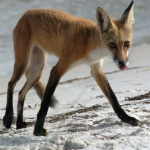
The Red Fox is a naturalized citizen in the Florida Animal Kingdom. They are usually seen in grassy pastures and, like the Bobcat, are night time hunters, preying on a diet of rodents and rabbits. They burrow large dens which serve as homes for their helpess newborns. These foxes will breed during the later part of each year.
Florida Panther
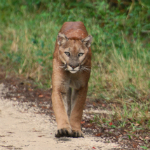
The Florida Panther, which are also known as cougars, are an extemely rare species to spot in the wild. These beautiful cats officially live only in south Florida but their population has been greatly affected by human development. To learn more about these shy cats learn more at our article "Florida Panthers Are Said to Roam In North Florida."
Armadillo
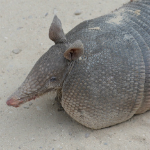
Native to the American Southwest, the Armadillo has made its presence established in Florida. They are considered a nusience, however, and can often damage lawns and flower beds as they dig for bugs at night. It is best to keep watering to a minimum or in the morning so the lawn can be dried out by time the armadillos are most active. To read more about protecting your lawn from these worm-hungry critters, visit our article, "Armadillos: Midnight Lawn Marauders."
Wild Hogs
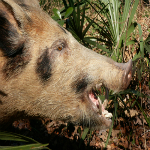
Wild Hogs are a non-native species in Florida, most likely introduced and released by Spanish settlers in the 16th century. They are found in all counties in Florida. Keeping a fence can be an effective preventative from these large animals from forging onto your property. They are a very popular animal to hunt in the state of Florida.
Contact
Wakulla County Extension Address
84 Cedar Avenue
Crawfordville, FL 32327
Hours
Monday - Friday
8:00am – 5pm
Samantha Kennedy
UF/IFAS Wakulla County Extension Director & FCS Agent
Phone (850) 926-3931
skennedy@ufl.edu

